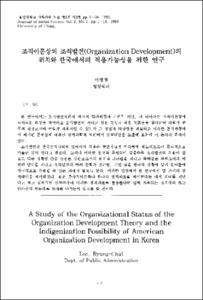Ti(C,N) 코팅에 의한 SKD11강의 내마모성 개선 연구
- Alternative Title
- Preliminary Study on Ti(C,N) Coating for Wear Resistance of SKD11 Tool Steel
- Abstract
- 코팅층의 밀착력을 향상시킬 목적으로 SKD11강을 플라즈마 질화하여 질소 확산층을 형성하고, 그 위에 PACVD법으로 TiN및 Ti(C,N)코팅층을 형성시키는 연구를 수행하였다.
PACVD공정에서 메탄(CH₄) 가스의 유입량이 증가되면 코팅층 두께와 경도는 증가하는 경향을 보였지만 내마모성을 감소하는 경향을 보였다. 메탄(CH₄) 가스와 유입량이 2vol.% 일 때 최대 임계박리 하중은 54N을 얻을 수 있으며 이때 코팅층의 두께는 2㎛이고 경도는 650Hv(50g 하중)이다. Ti(C,N)코팅층의 탄소와 질소 농도는 표면쪽에는 탄소가, 코팅층과 소재사이 경계면에는 질소의 농도가 높은 즉, 농도가 경사진 코팅층이 형성되었다.
코팅층의 경도와 임계박리 하중은 공정중의 템퍼린 효과 때문에 강의 템퍼링 온도에 무관하며 강의 표면조도는 코팅층의 조도, 경도 및 내마모성에 영향을 주지 않았다.
The formation and characterization of TiN or Ti(C,N) coatings on SKD11 tool steel nitrided prior to the coating layer formation for the strengthening of adhesive properties of coatings have been conducted. The thickness and hardness of the coatings increased with the increase of methane(CH₄) gas flow rate. However, wear properties of the coating were impaired by the increase of emthane(CH₄) gas flow rate. Maximum critical excoriation load of 54N for the Ti(C,N) coating was obtained with the methane(CH₄) flow rate were 2㎛ and 1650Hv(with the load of 50g) respectively.
The concentration of carbon and nitrogen was graded from the outer surface of the coating to the coating/alloy interface. Concentration of carbon was higher at the outer surface of the coating and the nitrogen concentration was higher at the interface.
The hardness and critical excoriation load of the Ti(C,N) coating was not dependant of the surface roughness and tempering temperature of SKD11 steel prior to the coating layer formation.
The formation and characterization of TiN or Ti(C,N) coatings on SKD11 tool steel nitrided prior to the coating layer formation for the strengthening of adhesive properties of coatings have been conducted. The thickness and hardness of the coatings increased with the increase of methane(CH₄) gas flow rate. However, wear properties of the coating were impaired by the increase of emthane(CH₄) gas flow rate. Maximum critical excoriation load of 54N for the Ti(C,N) coating was obtained with the methane(CH₄) flow rate were 2㎛ and 1650Hv(with the load of 50g) respectively.
The concentration of carbon and nitrogen was graded from the outer surface of the coating to the coating/alloy interface. Concentration of carbon was higher at the outer surface of the coating and the nitrogen concentration was higher at the interface.
The hardness and critical excoriation load of the Ti(C,N) coating was not dependant of the surface roughness and tempering temperature of SKD11 steel prior to the coating layer formation.
- Issued Date
- 2000
- Type
- Research Laboratory
- Alternative Author(s)
- Park,Jae-Yong; Kim,Heung-Shik
- Publisher
- 공학연구논문집
- Language
- kor
- Rights
- 울산대학교 저작물은 저작권에 의해 보호받습니다.
- Citation Volume
- 31
- Citation Number
- 1
- Citation Start Page
- 213
- Citation End Page
- 229
- Appears in Collections:
- Research Laboratory > Engineering Research
- 파일 목록
-
-
Download
 000002024775.pdf
기타 데이터 / 661.38 kB / Adobe PDF
000002024775.pdf
기타 데이터 / 661.38 kB / Adobe PDF
-
Items in Repository are protected by copyright, with all rights reserved, unless otherwise indicated.